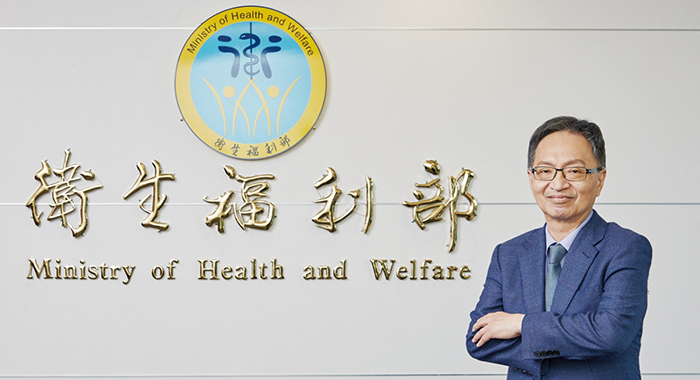By Dr. Hsueh Jui-yuan, minister of health and welfare, Republic of China (Taiwan)
As the world enters the fourth year of the COVID-19 pandemic, the situation is gradually improving. Most border restrictions have been lifted and global health governance has shifted from pandemic response to post-pandemic recovery. Countries worldwide have stepped up efforts to achieve health and well-being for all and further the realisation of United Nations Sustainable Development Goals (SDGs) whose progress was impacted by the pandemic.
Taiwan fully supports health-related SDGs and the World Health Organization’s triple billion targets. Indeed, Taiwan is committed to building a more resilient and equitable health service supply chain, maintaining an inclusive and equitable universal health coverage system, and providing disease prevention and management through a robust primary healthcare system. Taiwan is willing and able to share its experience in creating a cross-sectoral, innovative, and people-centred health approach to help the international community work toward the realisation of the SDGs related to health and well-being.
During the COVID-19 pandemic, Taiwan effectively mitigated the spread of the disease, leveraging its comprehensive public healthcare system, well-trained antipandemic personnel, and epidemiological surveillance, investigation, and analysis systems. Taiwan’s antipandemic response model included advance deployment and rapid response mechanisms. Other measures included border control policies, coordinated distribution of medical resources, and a patient transfer system to prevent and contain the pandemic at a time when vaccines and antiviral drugs were unavailable.
The Taiwanese people have played a pivotal role in the success of Taiwan’s antipandemic model by wearing masks, practicing social distancing, avoiding crowded areas, following quarantine regulations, and getting vaccinated. When compared with the 38 Organisation for Economic Co-operation and Development member states and Singapore, Taiwan ranks sixth-lowest in COVID-19 mortality and case-fatality rates. Taiwan also ranks fourth-highest for coverage rates of at least one COVID-19 vaccine dose and third-highest in terms of vaccine boosters administered.
Promoting health for all
Last year, WHO’s Director-General outlined five priorities for the subsequent five years, which are promoting health, providing health services, protecting health, powering progress, and performing. Moreover, WHO’s Achieving well-being: A draft global framework for integrating well-being into public health utilising a health promotion approach further demonstrates its commitment to health for all.
Taiwan established a universal healthcare insurance system in 1995. Since that time, the government has continued to provide disease prevention and healthcare services so that people of all ages can enjoy the right to health. Taiwan provides prenatal check-ups, gestational diabetes screening, anaemia testing, and three ultrasound examinations to reduce pregnancy risks and promote maternal and infant health. To assist infertile couples and reduce the financial burdens of in-vitro fertilisation, the government has continued to expand subsidised infertility treatment programs. Taiwan also aims to create a breastfeeding-friendly environment and provide preventive paediatric healthcare and health education.
What’s more, Taiwan has established a number of prevention and management programmes for noncommunicable diseases. For instance, programmes targeting chronic metabolic diseases assist at-risk groups, providing services such as diet and exercise guidance as well as smoking and betel nut cessation information to empower people to take control of their own health. Such initiatives improve lives and reduce the prevalence of high blood pressure, high cholesterol, and high blood sugar, which often lead to chronic disease. Taiwan also supports the global fight against cancer and WHO’s goal of reducing cancer mortality 25 percent by 2025. In line with WHO’s Cervical Cancer Elimination Initiative, Taiwan subsidizes cervical screenings and human papillomavirus vaccinations. HPV vaccines have been administered to female students aged 12 to 15 since 2018. By December 2022, a coverage rate of 92.1% had been achieved.
Innovative technology and universal health coverage
Taiwan’s National Health Insurance (NHI) is a prime example of universal health coverage, offering financial protection and access to a wide range of essential services. The COVID-19 pandemic helped the international community recognise the importance of regional cooperation and digitisation in healthcare. Taiwan is committed to promoting digital health and innovation to enhance the accessibility and quality of healthcare services, including plans for a next-generation NHI programme.
Taiwan has introduced innovative healthcare services, utilising real-time telehealth consultations for patients residing in remote areas and outlying islands, and is exploring applications for artificial intelligence and other emerging technologies. During the pandemic, Taiwan issued 13 export licenses for its herbal formula NRICM101 (Taiwan Chingguan Yihau) to help countries in the region combat the pandemic. Taiwan is currently implementing preventive measures for the post-pandemic era, such as strengthening the domestic production of critical drugs and active pharmaceutical ingredients to avert future drug shortages. Understanding how important it is to work with the international community, Taiwan will further share innovative technologies and best practices with partners around the world to advance universal health coverage.
Taiwan can help, and Taiwan is helping
Taiwan has not been invited to the World Health Assembly since 2017. Now that the COVID-19 pandemic is abating and dialogue on strengthening health systems worldwide is accelerating, Taiwan should not be left out. Taiwan can help, and Taiwan’s inclusion would make the world healthier, more sustainable, and more equitable.
Taiwan urges WHO and all relevant stakeholders to support Taiwan’s inclusion in the World Health Assembly as an observer, as well as Taiwan’s full participation in WHO meetings, mechanisms, and activities. Taiwan will continue to work with the world to help ensure the fundamental right to health enshrined in the WHO Constitution. In the spirit of the SDGs, no country should be left behind—especially not Taiwan, which has made significant contributions to global public health.
The opinions presented in this content belong to the author and may not necessarily reflect the perspectives or editorial stance of iWitness News. Opinion pieces can be submitted to [email protected].






